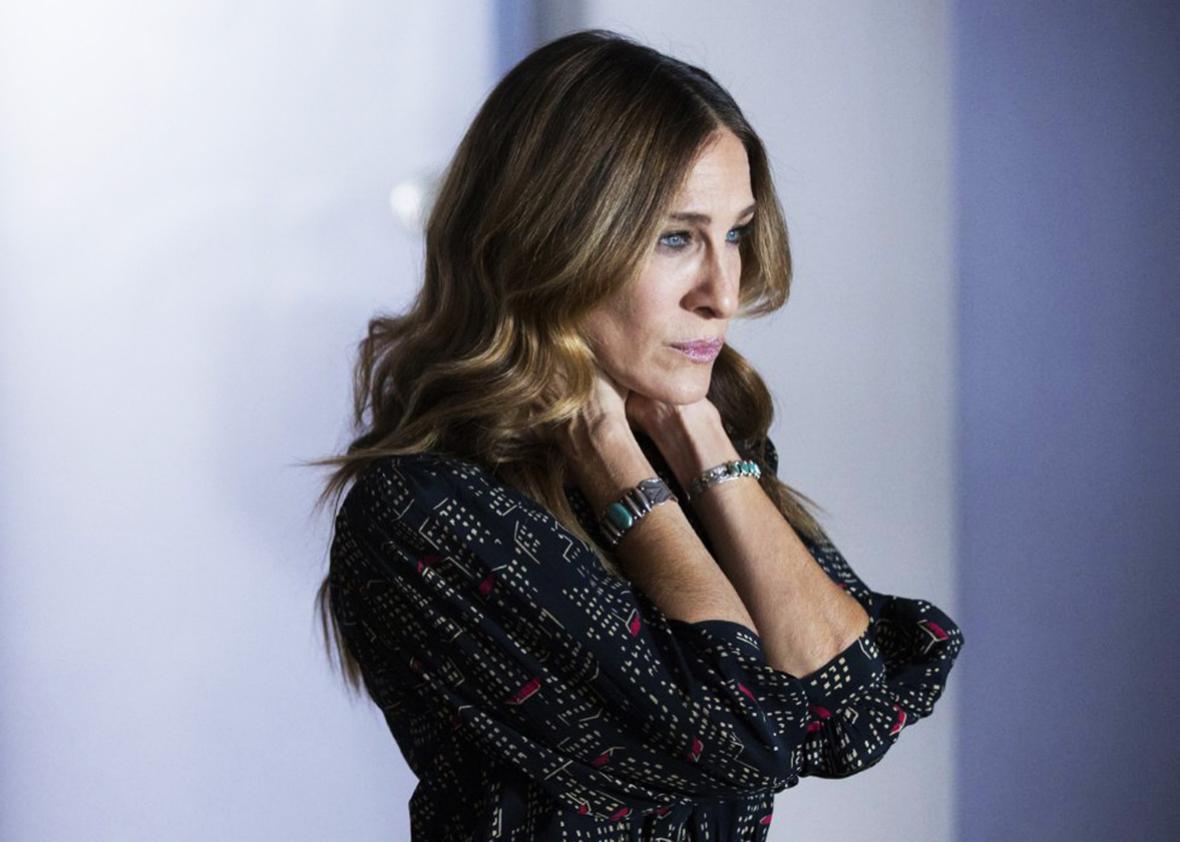Sarah Jessica Parker’s return to HBO, in the dark comedy Divorce, which premieres on Sunday night, should be a kind of glorious homecoming. For six seasons and two movies, Parker played Carrie Bradshaw on Sex and the City, HBO’s most beloved female character on its most successful comedy. But before you get carried away popping champagne and lighting sparklers, there is the celebration-corrective of Divorce itself, a strange and prickly show so keen to distance itself from all things Sex and the City that it almost plays as a rebuke to it.
Parker stars as Frances, an executive headhunter and mother of two, unhappily married to Robert (Thomas Haden Church), a buffoonish contractor. The family lives in Hastings, in Westchester (No Sex, Outside the City) where they moved so Robert could start his business, forcing Frances to support the family and give up her dreams of being a gallerist. Over the course of the first episode, a series of crises and revelations inspire first Frances, and then Robert, to ask for a divorce. Unlike the classic screwball comedies of remarriage (The Philadelphia Story, His Girl Friday, The Awful Truth), Divorce’s name is not a fake out. By fits and starts, kindnesses and cruelties, Frances and Robert begin to make their way down the slow, painful, potentially vengeful path toward legal separation.
Divorce is not an inherently funny subject, and Divorce is only fitfully funny. The show was created by Sharon Horgan (whom I profiled earlier this year), also the creator of Amazon’s hilarious Catastrophe, for Sarah Jessica Parker, who is an executive producer, alongside Horgan and Paul Simms, who acts as the series’ showrunner. The number of cooks in the kitchen, alongside HBO and its attendant executives, suggests the show’s stakes, but may also explain the muddled series that results.
Divorce is two shows in one. The moderately more successful is a very broad dark comedy featuring almost everyone in the series, except for Parker, as detestable caricatures. Molly Shannon and Tracy Letts play the married Diane and Nick, friends of Francis and Robert who go at each other like pit vipers in love, heinous, cruel, and co-dependent. Jemaine Clement is the preening Julian, a self-involved art history professor. A series of divorce lawyers include a hapless dope (Geoffrey Owens) and a menacing misogynist (Dean Winters). And twinkling ridiculously above all of them is Haden Church’s Robert, an unknowing fool with the bushy mustache to match. He’s an endless fount of clichéd business advice, always sticking his fingers in the fondue, oblivious to his wife’s simmering discontent, but also capable of moments of great decency, meted out exactly when you’ve written him off as an utter joker.
Divorce has an air of realism, but these characters are so grandiosely awful that, if they would only up their joke per minute rate, they would fit right in on 30 Rock, rubbing shoulders with the blithely idiotic Jenna Maroneys and Tracy Jordans of the world. Instead, they are rubbing shoulders with Parker’s Frances, who is operating in an entirely sober register. Parker’s Frances is taut, jaded, and unhappy, hemmed in and clamped down, defined more by what she isn’t—decisively not Carrie—than what she is. She and Robert seem so different it’s impossible to imagine they were ever well-married—like a snow owl would ever lie down with a goofy walrus. An actor’s desire not to repeat oneself is understandable, especially when she is as closely associated with a previous role as Parker is with Bradshaw, but there has got to be a better way to do something new than to suppress most of one’s native charisma.
Parker’s performance in Divorce, especially in the early episodes, before she’s given a few spazzy speeches, is about as close to a dramatic one as is possible for appearing in a comedy. Her commitment to keeping everything tamped down unsettles a series in which everyone else is playing a game of outsized emotional charades. The performance has an odd kind of stripped-down vanity: bleak and chilly enough that you don’t immediately like Francis, but not big and outrageous enough that you can hate her—or, more to the point, laugh at her.
